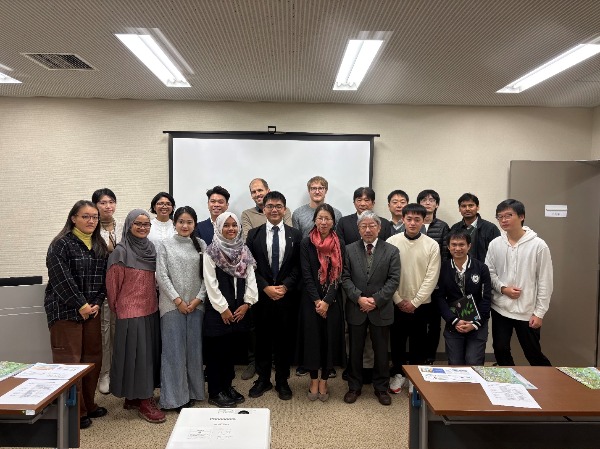Methane Matters: Innovating for a Greener Tomorrow
Jan 9, 2025
Bioenvironmental Sciences
Methane , one of the most potent greenhouse gases, presents significant opportunities for targeted reductions. As part of the Global Methane Pledge (GMP), nations are working to cut methane emissions by at least 30% by 2030. Recognizing the urgency, Dr. Wong Yong Jie and Dr. Yasue Bo from the Faculty of Bioenvironmental Science at Kyoto University of Advanced Science (KUAS) hosted the 1st Kansai Japan and Southeast Asia Methane Awareness and Monitoring Roundtable Discussion. This event brought together experts and leaders to address pressing challenges and innovations in methane mitigation, as well as explore circular economy practices.
Opening Remarks
The event opened with an inspiring address by Prof. Dr. Mimura Tetsuro, Vice President and Dean of the Faculty of Bioenvironmental Science at KUAS. Prof. Mimura warmly welcomed participants, emphasizing the importance of tackling methane emissions in the broader fight against climate change. He expressed optimism that the discussions would yield practical insights and actionable solutions to benefit both global and local communities.
Speaker Highlights
1. Dr. Bertrand Rouet-Leduc (Assistant Professor– Kyoto University)
Bertrand showcased the application of AI and multispectral satellite techniques for global methane detection. His approach has identified over 100,000 emission events annually, focusing on sources such as landfills and oil fields in areas like the Permian Basin. Looking forward, he aims to enhance detection precision and expand the methodology across industries.
2. Dr. Helena Varkkey (Associate Professor – Universiti Malaya)
Helena analyzed Malaysia’s methane emissions within the GMP framework. Methane contributes 15% of Malaysia’s total greenhouse gas emissions, largely from oil and gas and palm oil industries. She underscored the absence of a national methane action plan and advocated for improved Monitoring, Reporting, and Verification (MRV) systems. Additionally, Helena also highlighted the dual benefits of methane reduction, including better environmental outcomes and public health improvements.
3. Dr. Matthew Ashfold (Associate Professor – University of Nottingham Malaysia)
Matthew addressed the challenges of methane emissions data and policy in Malaysia. He highlighted discrepancies between national inventories and international datasets such as the IEA, advocating for integrated top-down (e.g., satellite) and bottom-up approaches to enhance accuracy. Matthew emphasized the cost-effectiveness of methane reduction strategies and the need for transparent reporting to meet GMP goals.
4. Miss Adelia Anju Asmara (Junior Assistant Professor- Universitas Islam Indonesia)
Anju shared Indonesia’s strategies to mitigate methane emissions from waste and coal mining. Initiatives such as waste-to-energy plants and methane monitoring systems align with Indonesia’s goal of reducing emissions by 30% by 2030. She stressed the importance of strong policy frameworks, capacity building, and the adoption of advanced technologies to accelerate progress.
5. Dr. Huynh Tan Loi (Senior Lecturer- Van Lang University)
Loi examined methane emissions from septic systems in Hanoi Vietnam. He found that anaerobic digestion in septic tanks is a significant source, with prolonged storage periods increasing emissions. Loi recommended regular maintenance of septic systems to effectively reduce greenhouse gases and enhance pollutant removal for environment protection.
Closing Remarks
The event concluded with a forward-looking message from Prof. Dr. Suzuki Reiji, Head of Bioenvironmental Design of KUAS. Prof. Suzuki described the discussion as a starting point for deeper collaborations on climate change and methane mitigation. He expressed optimism for future partnerships and emphasized the critical role of shared efforts among academia, industry, and policymakers in achieving meaningful progress.
Takeaway
This roundtable highlighted the urgent need for collective action to mitigate methane emissions. By combining innovative technologies, enhancing transparency, and fostering cross-sector partnerships, we can transform challenges into opportunities for a sustainable and greener future. This event marks the beginning of impactful collaborations toward a more climate-resilient world.
(Drs. Yasue Bo and Yong Jie Wong, Faculty of Bioenvironmental Sciences)